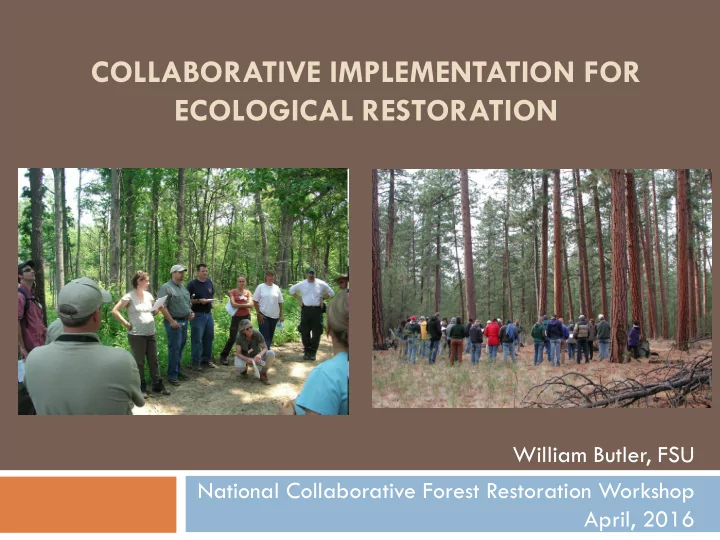

COLLABORATIVE IMPLEMENTATION FOR ECOLOGICAL RESTORATION William Butler, FSU National Collaborative Forest Restoration Workshop April, 2016
CFLRP research context Qualitative research on first 10 landscapes Interest in how USFS and partners navigating the transition from collaborative planning to collaborative implementation
Research Questions (1) How do participants conceptualize collaborative implementation in practice? (2) To what extent and how can collaborative groups contribute to implementation when management authority is vested in a single government agency, in this case, the United States Forest Service (USFS)? (3) How does engagement in collaborative implementation refine adaptive management in landscape scale ecological restoration efforts?
Collaborative Implementation Prioritization Enhancing Treatments Multi-party Monitoring
Prioritization Proposal Prioritization Ongoing Prioritization
Enhancing or Conducting Treatments Prescription training Cost Share Collaborative treatments
Multi-party Monitoring Qualitative Monitoring Scientific Monitoring
Issues of Authority and Legal Context CFLRP Mandated collaboration through planning, implementation and monitoring Existing rules Authority squarely on shoulders of USFS NEPA planning processes FACA collaborative processes Result Indirect activities to influence implementation actions
Strengthening Informal Accountability Accountability External oversight to hold actors responsible for their actions Formal accountability Hierarchical chains of command, Congressional oversight, audits, targets and reporting Informal or relational accountability Mechanisms arise from intangible informal institutions — norms, enculturation of virtues, commitment, felt responsibility Processes rather than ‘tools’ (Romzek et al. 2012; Weber 2003; Unerman & O’Dwyer 2006; Ebrahim, 2003)
Informal accountability in CFLRP Monitoring Qualitative reviews Prioritization Agency incorporation of stakeholder recommendations in final decisions Enhancing treatments Stakeholders shaping the nature of treatments
Adaptive Management Cycle Implementation Planning Monitoring Assess and Adjust
Refining Adaptive Management Enhancing Treatments Implementation Qualitative Ongoing Field Prioritization Reviews Monitoring Planning Proposal Scientific development Monitoring
Collaborative Implementation Blurs the lines of planning, implementation and monitoring Contributions to implementation are largely indirect Refines adaptive management to provide collaborative feedback in meaningful ways across time and space
Acknowledgements This research is supported with funding from the USFS Northern Research Station and TNC
Recommend
More recommend